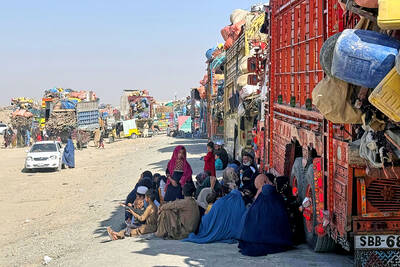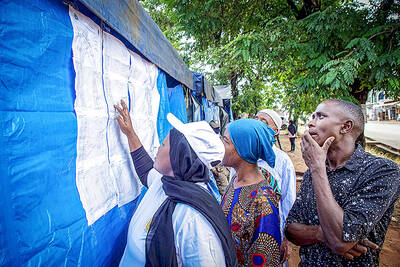France is pushing for a political agreement at the climate conference in Copenhagen to include a tax on financial transactions to assist the developing world, French Foreign Minister Bernard Kouchner said on Monday.
Kouchner said a very small tax — 0.005 percent on financial transactions — would help developing countries fight poverty, promote education and health and meet the costs of combatting climate change.
Such a tax on all financial movements would be “impossible to feel,” he said, explaining that it produces just US$0.05 “on a movement of a thousand dollars, a thousand euros.”
Kouchner told reporters after meeting UN Secretary-General Ban Ki-moon that France has been working on the tax idea for a year and hosted a conference in Paris in October with 59 countries as well as financial and economic experts to put together a proposal.
He conceded there is some opposition, even in liberal countries, but he predicted “all the people of the world will accept this kind of contribution.”
“It will be done, believe me, it will be done. I don’t know when. But I know that we [have] to rebalance the responsibility and the sufferings in this world,” Kouchner said.
“If it comes through this conference it will be a big, big, big, big benefit,” he said.
The secretary-general expressed hope that the French proposal “will be discussed in Copenhagen as a way to generate financial support in addition to public fundings to be provided by the governments.”
Kouchner said France is also pressing for the creation of a World Environment Organization with a mandate to monitor and verify the commitments made in Copenhagen on reducing carbon emissions.

With much pomp and circumstance, Cairo is today to inaugurate the long-awaited Grand Egyptian Museum (GEM), widely presented as the crowning jewel on authorities’ efforts to overhaul the country’s vital tourism industry. With a panoramic view of the Giza pyramids plateau, the museum houses thousands of artifacts spanning more than 5,000 years of Egyptian antiquity at a whopping cost of more than US$1 billion. More than two decades in the making, the ultra-modern museum anticipates 5 million visitors annually, with never-before-seen relics on display. In the run-up to the grand opening, Egyptian media and official statements have hailed the “historic moment,” describing the

‘CHILD PORNOGRAPHY’: The doll on Shein’s Web site measure about 80cm in height, and it was holding a teddy bear in a photo published by a daily newspaper France’s anti-fraud unit on Saturday said it had reported Asian e-commerce giant Shein (希音) for selling what it described as “sex dolls with a childlike appearance.” The French Directorate General for Competition, Consumer Affairs and Fraud Control (DGCCRF) said in a statement that the “description and categorization” of the items on Shein’s Web site “make it difficult to doubt the child pornography nature of the content.” Shortly after the statement, Shein announced that the dolls in question had been withdrawn from its platform and that it had launched an internal inquiry. On its Web site, Le Parisien daily published a

‘NO WORKABLE SOLUTION’: An official said Pakistan engaged in the spirit of peace, but Kabul continued its ‘unabated support to terrorists opposed to Pakistan’ Pakistan yesterday said that negotiations for a lasting truce with Afghanistan had “failed to bring about a workable solution,” warning that it would take steps to protect its people. Pakistan and Afghanistan have been holding negotiations in Istanbul, Turkey, aimed at securing peace after the South Asian neighbors’ deadliest border clashes in years. The violence, which killed more than 70 people and wounded hundreds, erupted following explosions in Kabul on Oct. 9 that the Taliban authorities blamed on Pakistan. “Regrettably, the Afghan side gave no assurances, kept deviating from the core issue and resorted to blame game, deflection and ruses,” Pakistani Minister of

UNCERTAIN TOLLS: Images on social media showed small protests that escalated, with reports of police shooting live rounds as polling stations were targeted Tanzania yesterday was on lockdown with a communications blackout, a day after elections turned into violent chaos with unconfirmed reports of many dead. Tanzanian President Samia Suluhu Hassan had sought to solidify her position and silence criticism within her party in the virtually uncontested polls, with the main challengers either jailed or disqualified. In the run-up, rights groups condemned a “wave of terror” in the east African nation, which has seen a string of high-profile abductions that ramped up in the final days. A heavy security presence on Wednesday failed to deter hundreds protesting in economic hub Dar es Salaam and elsewhere, some